Weathering of rocks and soil formation -> oxidation
What is Oxidation?
Oxidation is a chemical reaction in which a substance loses electrons, leading to an increase in its oxidation state. This process often involves the addition of oxygen or the removal of hydrogen from a compound.
Oxidation State
The oxidation state of an element in a compound is a measure of the degree of oxidation of that element. It indicates the number of electrons that an atom has gained or lost relative to the neutral atom.
Examples of Oxidation Reactions
1. Rusting of iron: When iron is exposed to oxygen and moisture, it undergoes oxidation to form iron oxide, also known as rust.
2. Burning of wood: Wood undergoes oxidation when it burns, combining with oxygen to produce carbon dioxide and water vapor.
3. Corrosion of metals: Many metals undergo oxidation when they react with oxygen in the air, leading to the formation of metal oxides.
4. Oxidation of food: When fruits and vegetables are exposed to air, they undergo oxidation, leading to the browning of the exposed surface.
Redox Reactions
Oxidation reactions often occur in conjunction with reduction reactions, collectively known as redox reactions. In a redox reaction, one substance undergoes oxidation while another undergoes reduction.
Importance of Oxidation
Oxidation reactions are essential for various biological processes, such as cellular respiration, in which glucose is oxidized to produce energy. Additionally, many industrial processes rely on oxidation reactions, including the production of metals and the generation of energy from fuels.
.◂Science Worksheets and Study Guides Seventh Grade. Weathering of rocks and soil formation
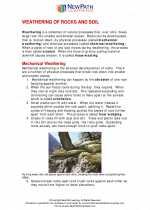
 Activity Lesson
Activity Lesson
 Worksheet/Answer key
Worksheet/Answer key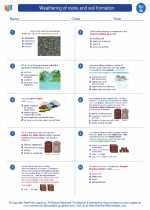
 Worksheet/Answer key
Worksheet/Answer key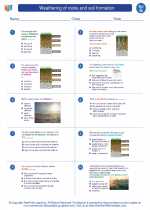
 Worksheet/Answer key
Worksheet/Answer key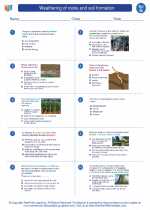
 Worksheet/Answer key
Worksheet/Answer key
 Vocabulary/Answer key
Vocabulary/Answer key
 Vocabulary/Answer key
Vocabulary/Answer key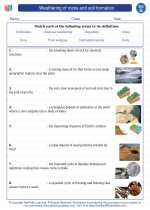
 Vocabulary/Answer key
Vocabulary/Answer key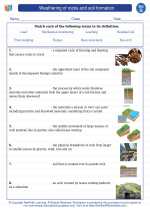
 Vocabulary/Answer key
Vocabulary/Answer key
